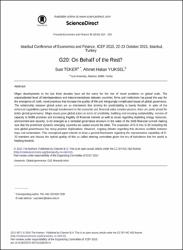G20: On Behalf of the Rest?
Künye
Teker, S. & Yüksel, A. H. (2016). G20: On behalf of the rest?. Paper presented at he Procedia Economics and Finance, 38, 219-223. doi:10.1016/S2212-5671(16)30193-9Özet
Major developments in the last three decades have set the scene for the rise of novel problems on global scale. The unprecedented level of interdependence and interconnectedness between countries, firms and institutions has paved the way for the emergence of, both, novel practices that increase the quality of life and intriguingly complicated issues of global governance. The relationship between global actors are so intertwined that striving for predictability is barely feasible. In spite of the enhanced capabilities gained through involvement in the economic and financial value creation process, there are perils ahead for better global governance. Major issues pose global actors in terms of credibility, building and ensuring sustainability, erosion of capacity to fulfill promises and increasing fragility of financial markets as well as issues regarding depleting energy resources, environment and security. G-20 emerged as a remedial governance structure in the wake of the 2008 financial turmoil making sure that the prominent dynamic emerging countries are seated around the table. The expansion of G-8 into G-20 including the new global powerhouses has many positive implications. However, ongoing debates regarding this structure oscillate between hope and contestation. This conceptual paper intends to draw a general framework regarding the representative capability of G20 members and discuss the hybrid quality of this so called steering committee given the era of turbulence that the world is heading towards.


















